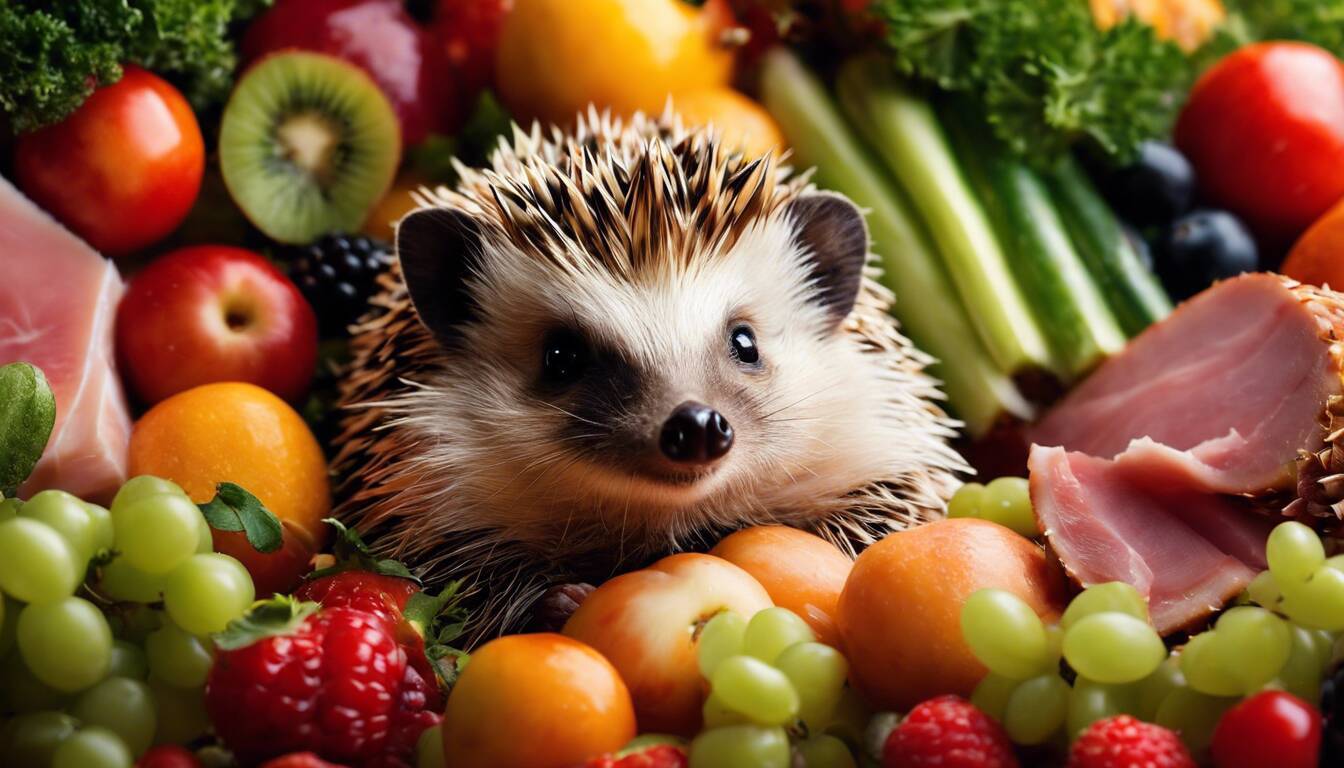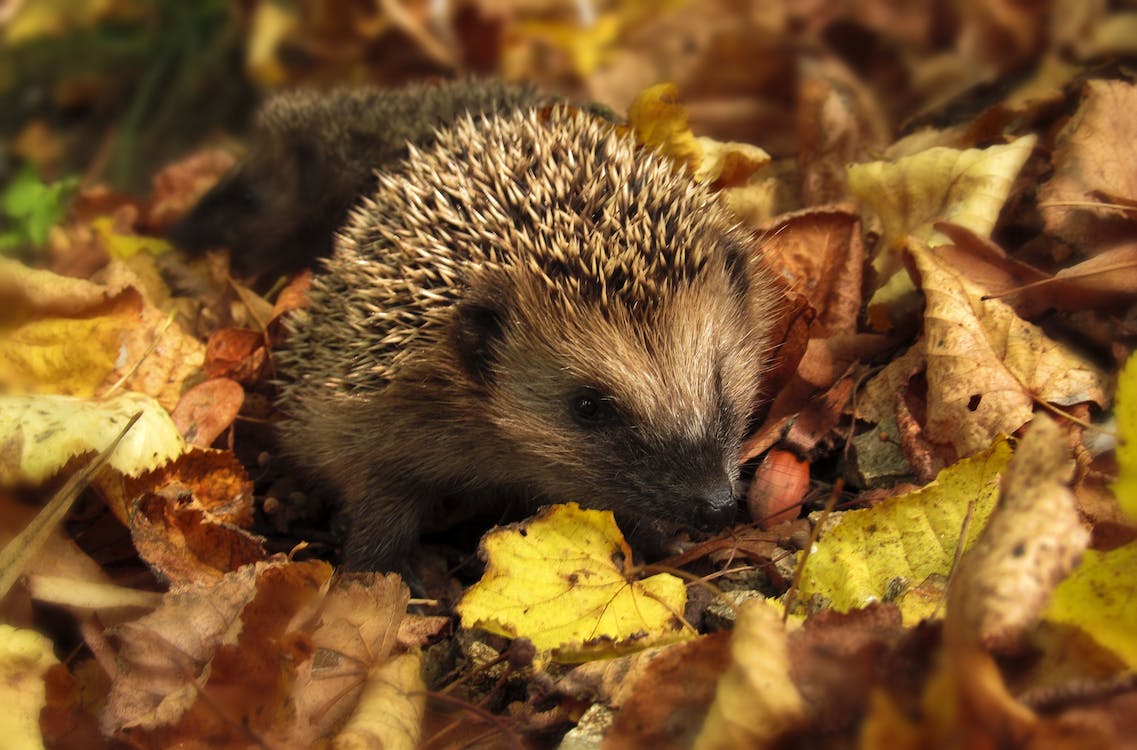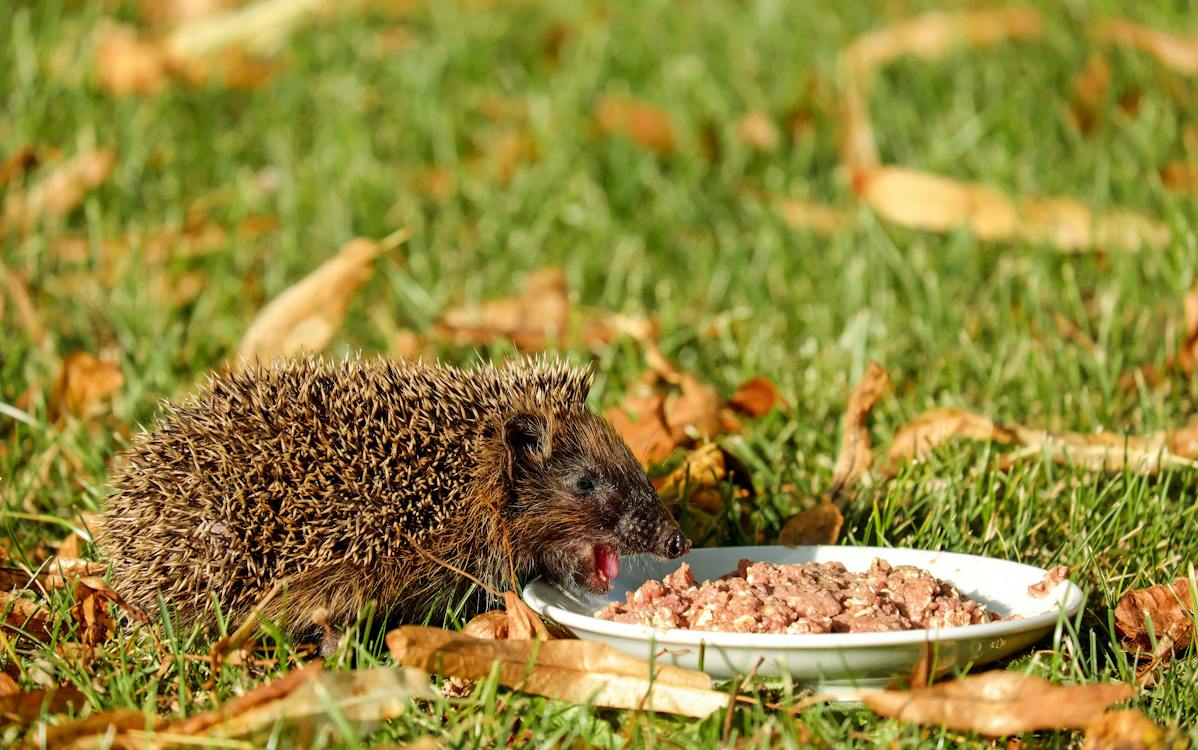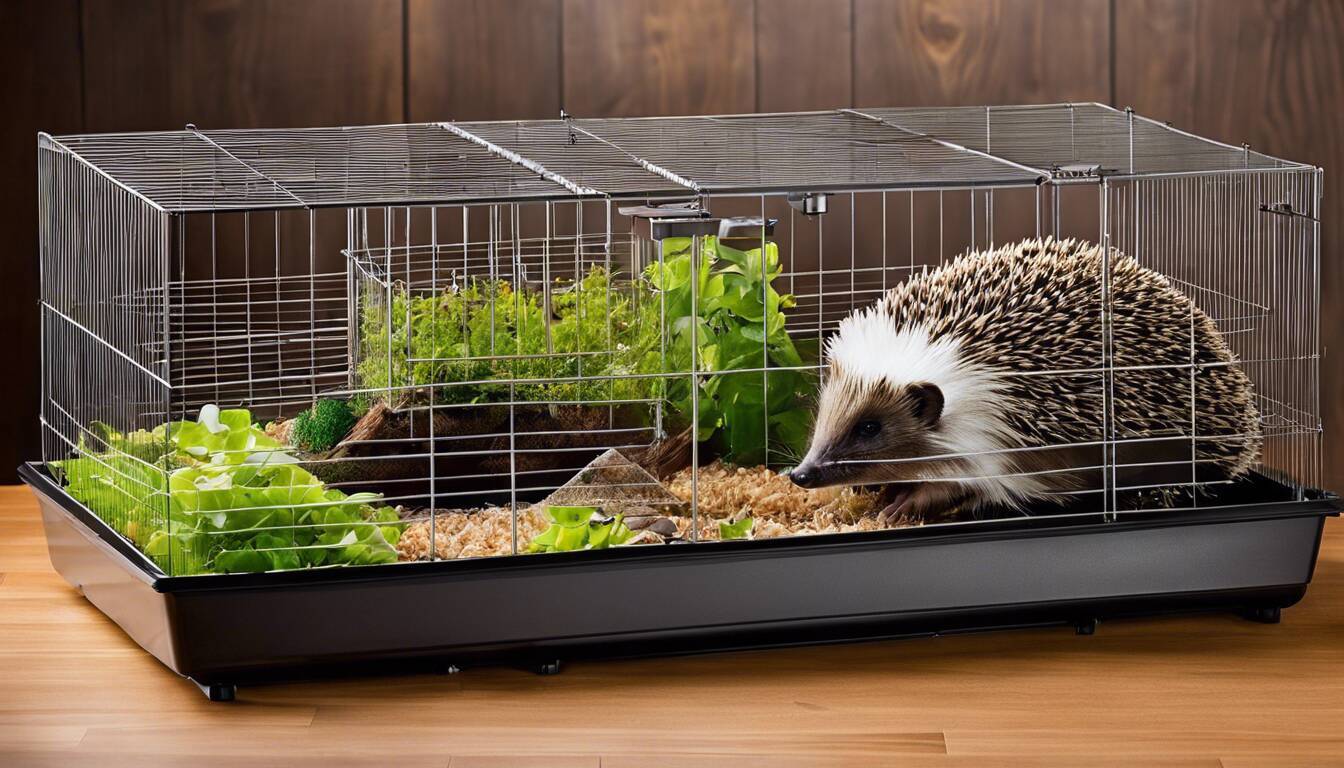No, it’s not recommended to regularly feed ham to a hedgehog. High levels of salt and fat found in ham can be harmful to the health of these small pets, making it a less than ideal choice. While surprising, more suitable alternatives lie among insects and vegetables, which offer a balanced nutrient mix for the prickly little companions. Let’s delve into how this works, shall we?
While some sources may recommend small amounts of cooked, unseasoned, uncured ham for hedgehogs due to its high protein content, it’s best to prioritize their main diet of high-quality, low-fat, high-protein cat or dog food. Ham should be given sparingly and as an occasional treat, with close attention to ensure it doesn’t cause any digestive issues.
Ham and Hedgehogs: A Detailed Analysis
Ham, a popular meat derived from the hind leg of pigs, has made its way onto many dining tables around the world. While it may be a delicious protein source for humans, it’s important to consider its potential impact on our spiky friends—the hedgehogs.
The Nutritional Concerns
Hedgehog diets need to be carefully managed to ensure they receive the right blend of nutrients—not too much fat, not too much salt. When it comes to ham, the main issues for hedgehogs stem from its high salt and fat content. Too much salt can cause dehydration in hedgehogs, while excessive fat intake can lead to obesity and related health problems. So even though these tasty morsels are appealing to humans, they may not be the best choice for our hedgehog pets.
Let’s break down some of the specifics: a standard 3-ounce serving of ham contains approximately 16g of protein and 9g of fat. Unfortunately, it also packs a whopping 1,020mg of sodium—nearly half the recommended daily intake for an adult human. Considering that hedgehogs generally require a diet consisting of 20-30% protein and 15-20% fat, eating ham would throw this balance into disarray.
So if too much ham can be detrimental to their health, is there any merit at all in feeding them this meat?
The Alternative Options
While ham may not be the best choice for hedgehogs, there are plenty of other nutritious options available. In moderation, hedgehogs can enjoy lean proteins such as chicken, turkey, beef, liver, kidney, lamb, pheasant, and fish. These meats provide essential protein without the excessive salt and fat content found in ham.
It’s important to remember that variety is key when planning a balanced diet for these little insectivores. In addition to lean meats, hedgehogs can benefit from ample servings of fruits and vegetables, providing them with essential vitamins and minerals.
So through choosing lean meats and an assortment of healthy treats, you can ensure that your pet hedgehog stays content and healthy with a well-balanced nutritional intake.
Now let’s address the safety aspects of ham specifically for our spiky friends in the next section.
The Safety of Ham for Hedgehogs
When considering the safety of feeding ham to hedgehogs, it’s essential to take into account a few key factors. First and foremost, one critical concern is the high salt content found in ham, as this can have significant health implications for our spiky friends.
High Salt Content
Ham typically contains high levels of salt, which can lead to various health problems in hedgehogs. Excessive salt intake can put strain on their kidneys and contribute to heart issues, leading to serious health consequences for these tiny mammals. As part of a balanced diet, hedgehogs need minimal salt intake to maintain their overall well-being. Therefore, feeding them ham with its high sodium content can disrupt this delicate balance and pose a risk to their health.
Given their small size, even a small amount of high-salt food such as ham can have an outsized impact on their health. Regular consumption of ham could gradually lead to kidney damage or hypertension in hedgehogs over time.
Risks of High Fat
Apart from the high salt content, another concern surrounding ham is its fat content. Hedgehogs are susceptible to obesity and related health complications when exposed to excessive fat intake. Ham contains significant levels of fat, which may be difficult for hedgehogs to process efficiently. Obesity can lead to a multitude of health issues, including cardiovascular problems and reduced mobility, so it’s crucial to monitor fat intake closely in their diet.
Just like us humans, hedgehogs need a healthy balance in their diet to stay active and sprightly.
Potential Disease Risks
In addition to the nutritional concerns, uncooked, uncured ham poses specific risks to hedgehog health due to the potential for infections. Two notable infections that can arise from consuming uncooked, uncured ham are trichinosis and salmonella. These infections can be harmful or even fatal for hedgehogs, posing a serious threat to their well-being. Ensuring that their diet is free from foods that carry these potential risks is vital for maintaining their health and longevity.
These infections can cause severe gastrointestinal issues and overall weakness in hedgehogs, making it crucial to steer clear from uncooked or improperly prepared ham as part of their diet.
Therefore, considering the detrimental impact that high salt and fat content in ham can have on hedgehog health, along with the potential disease risks associated with consuming uncooked or uncured ham, it is advisable to avoid including ham in their regular diet. Opting for safer and more suitable alternatives will help ensure the well-being of these delightful little creatures.
As we safeguard the well-being of our spiky companions by eliminating risky dietary options, let’s now explore some nutritious alternatives that will keep them healthy and content.
Nutritious Alternatives to Ham for Hedgehogs
Hedgehogs require a balanced diet to maintain their health and overall well-being. While ham may not provide the ideal nutritional balance for these small animals, there are several alternatives that offer both variety and essential nutrients.
Insects
Insects such as crickets, mealworms, and waxworms are a natural part of a hedgehog’s diet and are rich in protein. These wriggly creatures mimic the small prey that hedgehogs would eat in the wild, making them an excellent protein source. When feeding insects to your hedgehog, ensure they are purchased from reputable sources to prevent the risk of contamination with harmful chemicals or parasites. Always remember to feed insects in moderation as they should not make up the entirety of your hedgehog’s diet.
Lean Meats
Similar to humans, hedgehogs need lean meats to thrive. Cooked, unseasoned meats like chicken, turkey, and beef provide necessary protein without the high fat and salt content found in ham. These options can be a vital component of a hedgehog’s diet but should not replace the primary protein sources such as high-quality cat or dog food.
Fruits and Vegetables
Certain fruits and vegetables can offer essential vitamins and minerals while adding variety to a hedgehog’s diet. Apples, bananas, carrots, green beans, and sweet potatoes can provide a range of nutrients crucial for your hedgehog’s health. However, it is important to note that fruits should be fed in moderation due to their sugar content. Always introduce new foods slowly to monitor any adverse reactions your hedgehog might have.
Hedgehogs benefit from dietary diversity, so rotating between different types of insects, lean meats, fruits, and vegetables can help ensure they receive a well-rounded set of nutrients.
Remember that fresh water should always be available for your pet hedgehog. In addition to these alternative foods, water is crucial for maintaining their hydration and overall health. Ensure that you are utilizing a shallow dish that cannot be easily tipped over or walked through. By offering a diverse range of foods alongside fresh water, you will help keep your hedgehog happy and healthy for years to come.
By incorporating these nutritious alternatives into your hedgehog’s diet, you can help ensure they receive all the essential nutrients required for their overall health and well-being.
As we continue to explore the best practices for caring for your precious hedgehog friend, let’s now delve into creating a balanced diet that addresses all their dietary needs.
Creating a Balanced Hedgehog Diet
Hedgehogs, like us, require a diverse diet to stay healthy. This means their meals should feature a mix of essential nutrients – proteins, fats, fiber, vitamins, and minerals. Each of these elements plays an essential role in maintaining a hedgehog’s health.
Essential Nutrients
Proteins are crucial for muscle growth and repair, fats provide energy and help with keeping their skin and coat healthy, while fiber keeps their digestion regular, and vitamins and minerals support their overall well-being.
For instance:
Nutrient |
Sources |
|---|---|
Proteins |
Insects like mealworms or crickets, unseasoned meats such as chicken or turkey |
Fats |
Healthy fats from insects, certain cat foods, and small amounts of cooked meat |
Fiber |
Insects, small amounts of vegetables and fruits |
It’s similar to how we need a variety of food groups in our diet. Just like we wouldn’t eat the same thing every day because it wouldn’t give us all the things we need to stay strong and healthy.
Commercial Hedgehog Food
Pet stores offer specialized hedgehog food formulated to meet the nutritional needs of these unique little critters. A good quality commercial hedgehog food can be a convenient option for ensuring that your pet gets a balanced diet. These foods are carefully formulated to provide the right balance of essential nutrients, making them a reliable choice for busy hedgehog owners.
However, it’s important not to rely solely on commercial food. A diverse diet is key, so make sure your hedgehog’s meals include other items like insects, unseasoned meats (such as chicken or turkey), some fruits and vegetables, and treats such as eggs or baby food from time to time.
By combining commercial hedgehog food with additional nutritious options, you can ensure that your delightful little pet gets all the vitamins and minerals necessary for optimal health.
As we continue exploring ways to keep your hedgehog healthy and happy, let’s now turn our attention to ensuring their nutritional needs stay well-met.
Ensuring Nutritional Needs of Hedgehogs
When it comes to the diet of a pet hedgehog, it’s not just about what you feed them, but also how much and how often. Just like us humans, hedgehogs need a balanced diet to stay healthy and happy. Let’s explore some key aspects of meeting their nutritional needs.
Consultation with a Veterinarian
Consulting with a veterinarian who specializes in exotic pets before making any changes to your hedgehog’s diet is essential. They will offer expert advice tailored specifically for your hedgehog, considering factors such as age, weight, and any specific health concerns. This personalized guidance is invaluable in ensuring that your hedgehog’s nutritional needs are met in the best possible way.
Veterinarians knowledgeable about hedgehogs will provide insight into the ideal balance of protein, fat, and other nutrients for your pet. They can recommend specific commercial hedgehog food brands or guide you on preparing homemade diets that fulfill their dietary requirements.
Daily Food and Water
Hedgehogs should have access to clean, fresh water at all times since hydration is crucial for their overall well-being. In terms of food, a high-quality hedgehog diet should feature a good balance of protein, fats, fiber, vitamins, and minerals. Commercial hedgehog food can be a convenient option as it is formulated to meet their specific dietary needs.
This specialized food typically consists of a mix containing various ingredients such as poultry meal, fish meal, rice, fruits, and vegetables rich in vitamins and minerals. It’s important to ensure that these foods don’t contain harmful additives or excessive preservatives that may negatively impact a hedgehog’s health. Always check the ingredient list to ensure they meet the required standards for your pet’s nutrition.
Remember: Consistency in feeding practices is important for hedgies.
Offering a diverse range of high-quality insects like mealworms and crickets along with occasional portions of cooked lean meats or unseasoned cooked eggs contributes to a well-rounded diet for pet hedgehogs. These sources provide essential protein and fat that align with the natural dietary preferences of hedgehogs.
By offering an array of nutrient-dense foods while reinforcing consistency in feeding practices as advised by veterinary professionals, hedgehog owners can play an active role in ensuring the dietary needs of their beloved pets are met for long-term health and happiness.
Amidst these considerations lies the importance of understanding the potential risks associated with certain food choices for hedgehogs. To further enhance our knowledge about this, let’s delve into the next section: “Risks and Precautions of Ham in Hedgehog Diet.
Risks and Precautions of Ham in Hedgehog Diet
Hedgehogs have unique dietary requirements, and it’s vital to be aware of the potential hazards ham can pose to their health. While ham may seem like a tasty treat, there are specific concerns to consider when including it in their diet.
Digestive Issues
Feeding ham to hedgehogs can lead to digestive problems due to the high fat content and salt, potentially causing discomfort and health issues. The sensitive digestive systems of hedgehogs can be adversely affected by foods high in fat and salt, leading to discomfort, diarrhea, or more severe digestive disturbances.
It’s important to remember that hedgehogs have very different dietary needs compared to humans or other pets. Ham might seem harmless to us, but for hedgehogs, it can cause significant problems if regularly consumed. Any changes in their diet should be approached with caution, taking into account their unique requirements.
Long-Term Health Implications
Regular consumption of ham can contribute to long-term health problems and reduce the overall lifespan of hedgehogs if not carefully monitored. The high-fat content in ham can lead to obesity, which is detrimental to a hedgehog’s well-being. Additionally, excessive salt intake can elevate blood pressure, leading to various health issues.
This highlights the need for hedgehog owners to be mindful of the treats they provide and ensure that they align with a hedgehog’s natural dietary needs. What may be a harmless snack for humans could have serious implications for these small quilled pets.
Seeking Professional Advice
When advocating for disease prevention, weight management, or overall health advice for your hedgehog, consulting a professional veterinarian is crucial. If considering transitioning your hedgehog to a healthier diet or addressing any nutrition-related issues, seeking assistance from a qualified vet is highly recommended.
For comprehensive insights into maintaining the optimal health of your pet, consulting an expert in exotic pet nutrition could provide valuable guidance.
It is imperative always to prioritize the health and well-being of our beloved spiky companions when considering any changes or additions to their diet.
In conclusion, ensuring the well-being of your hedgehog means carefully considering the food they consume while being attentive to any potential risks or adverse effects on their health.




